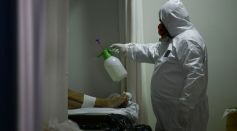MEDICINE & HEALTH
Testicles Are Serving as 'Reservoirs' For Coronavirus Making Men More At Risk of Longer and Severe Case of COVID-19: Study

Fear of Possible Second Wave of Coronavirus Outbreak Spikes in China Amid 16 New Cases Reportedly Orignating From Medical Staff at Wuhan

Baltimore Therapy Dog Uses FaceTime to Comfort Hospital Patients

Geneticists Say Coronavirus Outbreak Started as Early as September Casting Doubts to its Origin

Young Boy Aged 7 Left Alone After Losing Mother and Grandmother to Coronavirus While Father is Still Recovering in the Hospital
Margit Feldman, Holocaust Survivor, Loses Battle to the Pandemic at the Age of 90

Twin Pandas Born During the Time of COVID-19 Named 'Safe' and 'Sound'

CORONAVIRUS: Video Footage of Dead Bodies Lying Beside Alive Patients in a Hospital in Brazil Made Rounds Online

Watch! Paralyzed, Unable to Talk and Swallow, 58-year Old Man Conquers Coronavirus Against All Odds; Video Captures Touching Moment While Discharged From Hospital

Must-Haves For Pregnant Women As Advised By Expert Moms
Wuhan, China Revises COVID-19 Death Toll Up by 50% More to Over 4,600 Amid Allegations of Cover Up: Officials Explain Why

99-Year-Old War Veteran Who Pledges to Walk 100 Laps Around His Garden Raised $24M For Frontliners

Scientists Create CRISPR-based Coronavirus Test That Gives Off Results in 40 minutes: It Works Like a Pregnancy Test

Make Your Mom Feel Special This Mother's Day With These Top Health Essential Products You Can Get From Amazon!
Most Popular

NASA Reveals an Astronaut Was Medically Evacuated From the ISS for the First Time After a Non-Emergency Health Scare

Sun Reaches Solar Maximum: What the Intensifying 11-Year Solar Cycle Means for Earth

How the Immune System Fights Diseases: Antibodies, Vaccines & Lasting Protection

Ancient Interbreeding Between Neanderthals and Modern Humans Revealed





